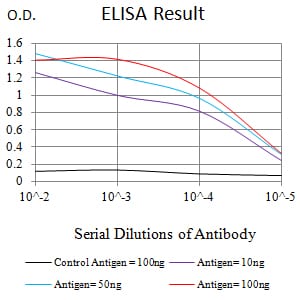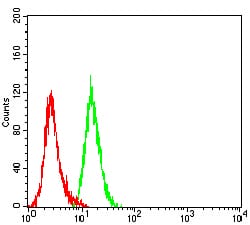

| WB | 咨询技术 | Human,Mouse,Rat |
| IF | 咨询技术 | Human,Mouse,Rat |
| IHC | 咨询技术 | Human,Mouse,Rat |
| ICC | 技术咨询 | Human,Mouse,Rat |
| FCM | 1/200 - 1/400 | Human,Mouse,Rat |
| Elisa | 1/10000 | Human,Mouse,Rat |
| Aliases | MPF; SMRP |
| Entrez GeneID | 10232 |
| clone | 4H12F8 |
| WB Predicted band size | 69kDa |
| Host/Isotype | Mouse IgG1 |
| Antibody Type | Primary antibody |
| Storage | Store at 4°C short term. Aliquot and store at -20°C long term. Avoid freeze/thaw cycles. |
| Species Reactivity | Human |
| Immunogen | Purified recombinant fragment of human MSLN (AA: 37-286) expressed in E. Coli. |
| Formulation | Purified antibody in PBS with 0.05% sodium azide |
+ +
以下是关于MSLN抗体的3篇代表性文献及其摘要:
---
1. **文献名称**:*"Mesothelin Immunotoxin SS1P in Combination with Chemotherapy in Patients with Mesothelin-Expressing Malignancies"*
**作者**:Hassan R, Pastan I, et al.
**摘要**:该研究评估了抗MSLN免疫毒素SS1P联合化疗在间皮瘤和卵巢癌患者中的安全性和有效性,显示其可靶向抑制肿瘤生长,但存在剂量限制性毒性(如血管渗漏综合征)。
2. **文献名称**:*"CAR T Cells Targeting Mesothelin in Solid Tumors: Preclinical Efficacy and Immune Modulation"*
**作者**:Morello A, Sadelain M, et al.
**摘要**:研究开发了靶向MSLN的CAR-T细胞,在胰腺癌和间皮瘤的临床前模型中表现出显著抗肿瘤活性,并揭示了肿瘤微环境对其疗效的影响机制。
3. **文献名称**:*"Phase I Study of the Anti-Mesothelin Antibody-Drug Conjugate LMB-100 in Patients with Advanced Cancers"*
**作者**:Hollevoet K, Pastan I, et al.
**摘要**:一期临床试验显示,LMB-100(抗MSLN抗体偶联药物)在晚期实体瘤患者中部分缓解,但因免疫原性和毒性需进一步优化剂量策略。
---
**补充说明**:
- MSLN抗体研究多集中于免疫毒素、CAR-T及ADC领域,上述文献覆盖了不同治疗策略的临床转化。
- Pastan团队是MSLN靶向治疗的重要推动者,其开发的SS1P和LMB-100为后续研究奠定基础。
- 如需扩展,可参考综述类文献(如*"Mesothelin as a Target for Cancer Therapy"* in *Nature Reviews Cancer*)了解全局进展。
Mesothelin (MSLN) is a cell surface glycoprotein anchored by glycosylphosphatidylinositol (GPI), primarily expressed in mesothelial cells lining pleura, pericardium, and peritoneum. It gained attention due to its significant overexpression in several aggressive cancers, including mesothelioma, pancreatic adenocarcinoma, ovarian cancer, and lung adenocarcinoma, while showing limited presence in normal tissues. This tumor-restricted expression makes MSLN a promising therapeutic target.
MSLN antibodies are designed to exploit this specificity. In diagnostics, they aid in detecting MSLN-positive tumors via immunohistochemistry or imaging. Therapeutically, MSLN-targeting antibodies are developed in multiple formats: (1) **Naked monoclonal antibodies** (e.g., amatuximab) blocking MSLN interactions with CA125/MUC16 to inhibit tumor growth; (2) **Antibody-drug conjugates** (ADCs), such as anetumab ravtansine, delivering cytotoxic agents directly to tumors; (3) **CAR-T therapies** using anti-MSLN single-chain variable fragments (scFvs) to redirect T cells against cancer; and (4) **Bispecific antibodies** engaging immune cells (e.g., CD3) for enhanced tumor killing.
Challenges include managing potential on-target/off-tumor toxicity, despite low MSLN expression in normal tissues, and addressing tumor heterogeneity. Current research focuses on optimizing antibody design, combination therapies, and biomarkers to predict response. MSLN-targeting agents, particularly ADCs and CAR-Ts, show encouraging early-phase clinical results, highlighting their potential in treating refractory solid tumors.
×